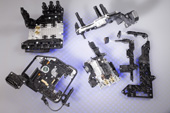Mar 29 2009
Dual-clutch transmissions are among the most innovative automatic transmissions. And the same applies to their control units, which have been systematically improved by Continental over the last five years since they were first used at Volkswagen. Now the next generation of this complex family of components is being serially employed by numerous car manufacturers. The plastic parts of the integrated control units for these dual-clutch transmissions used at VW, Audi, Ford and BMW are made of Ultramid® A3WG6, a proven PA 66 produced by BASF. This material is highly heat-stabilized, oil-resistant and, if needed, laser-markable.

The transmission control unit is a sophisticated, compact mechatronic component that is installed directly on the transmission and is thus also surrounded by hot transmission oil. Consequently, the main requirement made of this plastic part – into which numerous sensors, molded interconnect devices and other metallic structures have to be securely integrated – is that it has to be chemically resistant to transmission oil within the temperature range from -40°C to +145°C [-40°F to +293°F]. It even has to be able to withstand brief peak temperatures of up to +170°C [+338°F] without being damaged. In this context, transmission oils pose quite a challenge since they are considerably more aggressive and less standardized than motor oils. But even under such harsh conditions, this material has no problem ensuring the requisite high level of dimensional stability of the plastic parts.
Two clutches and yet lower fuel consumption
The dual-clutch transmission consists of two separate clutches, each driving specific gears. The main task of the electronic control unit is to ascertain the next gear needed as a function of the driving circumstances so that it can then engage one clutch and disengage the other. When the gear is being shifted, the next gear is already selected in the not-yet active transmission part before the actual shifting operation. This accounts for smooth gear shifting, without any interruption of the power transmission. Not least due to the intelligent control unit, it is now possible to further improve the efficiency of these transmissions and to cut fuel consumption to a level that is even lower than that of a manual transmission. These properties alone have already made the dual-clutch transmission and its electronic control unit a market success.
The Continental corporation, with sales of over 24 billion euros in 2008, is among the world’s leading automotive suppliers. As a manufacturer of brake systems, components and systems for the powertrain and chassis, instruments, infotainment solutions, on-board electronics, tires and engineering elastomer products, this company contributes to greater driving safety and climate protection. Continental is also a competent partner in the realm of networked automotive communication. It has almost 140,000 employees in about 190 locations in 35 countries.
The Powertrain Division of the automotive supplier Continental AG offers innovative and efficient system solutions for the sector of powertrains in vehicles, thus improving performance and driving comfort while also lowering consumption and emission levels. As a partner of the automotive industry, this division develops and manufactures a comprehensive portfolio of products ranging from gasoline and diesel-injection systems to engine and transmission control units as well as fuel-conveyance systems, all the way to components and systems for hybrid drives in more than 60 locations throughout the world. This division chalked up sales of more than 4 billion euros in 2008 and currently employs around 25,000 people.